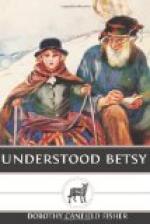There was a big silence; Cousin Ann stood, perfectly motionless up in her tree, staring down through the leaves at Betsy. Uncle Henry was turned around on his ladder, one hand on an apple as though it had frozen there, staring down at Betsy. Aunt Abigail leaned with both fat hands on her barrel, staring hard at Betsy. Betsy was staring down at her shoes, biting her lips and winking her eyes. The yellow, hazy October sun sank slowly down toward the rim of Hemlock Mountain, and sent long, golden shafts of light through the branches of the trees upon this group of people, all so silent, so motionless.
[Illustration: Betsy was staring down at her shoes, biting her lips and winking her eyes.]
Betsy was the first to speak, and I’m very proud of her for what she said. She said, loyally, “Dear Aunt Frances! She was always so sweet to me! She always tried so hard to take care of me!”
For that was what Betsy had found up by the brook under the big red maple-tree. She had found there a certainty that, whatever else she did, she must not hurt Aunt Frances’s feelings—dear, gentle, sweet Aunt Frances, whose feelings were so easily hurt and who had given her so many years of such anxious care. Something up there had told her— perhaps the quiet blue shadow of Windward Mountain creeping slowly over the pasture toward her, perhaps the silent glory of the great red-and-gold tree, perhaps the singing murmur of the little brook—perhaps all of them together had told her that now had come a time when she must do more than what Cousin Ann would do—when she must do what she herself knew was right. And that was to protect Aunt Frances from hurt.
When she spoke, out there in the orchard, she broke the spell of silence. Cousin Ann climbed hastily down from her tree, with her basket only partly filled. Uncle Henry got stiffly off his ladder, and Aunt Abigail advanced through the grass. And they all said the same thing— “Let me see that letter.”
They read it there, looking over each other’s shoulders, with grave faces. Then, still silently, they all turned and went back into the house, leaving their forgotten bags and barrels and baskets out under the trees. When they found themselves in the kitchen—“Well, it’s suppertime, anyhow,” said Cousin Ann hastily, as if ashamed of losing her composure, “or almost time. We might as well get it now.”
“I’m a-going out to milk,” said Uncle Henry gruffly, although it was not nearly his usual time. He took up the milk pails and marched out toward the barn, stepping heavily, his head hanging.
Shep woke up with a snort and, getting off the couch, gamboled clumsily up to Betsy, wagging his tail and jumping up on her, ready for a frolic. That was almost too much for Betsy! To think that after tomorrow she would never see Shep again—nor Eleanor! Nor the kittens! She choked as she bent over Shep and put her arms around his neck for a great hug. But she mustn’t cry, she mustn’t hurt Aunt Frances’s feelings, or show that she wasn’t glad to go back to her. That wouldn’t be fair, after all Aunt Frances had done for her!




